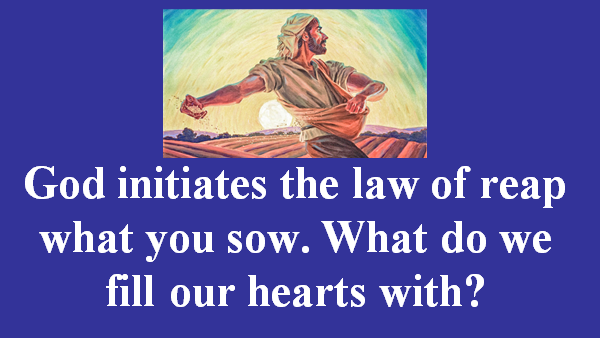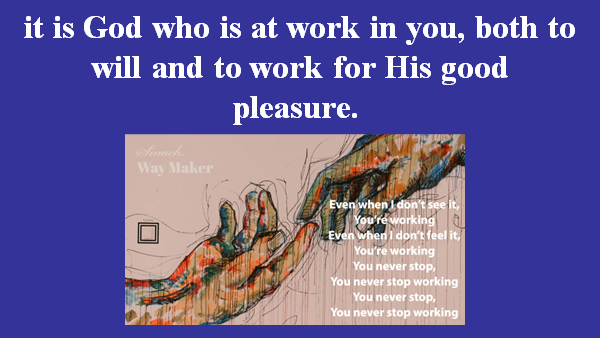The filling of the Holy Spirit: clinging to God.
length: 66:12 - taught on Feb, 15 2023
Class Outline:
Wednesday February 15,2023

Ignatius was the bishop of Antioch and in 107 A.D., well over seventy years old (born around the time of Christ’s death), the old bishop was condemned to death by imperial authorities. The persecution of Christians was not universal at the time. There were several factions in Antioch that Ignatius stood against as heretical, so we don’t know who, but someone, probably associated with a competitor for his office of bishop, accused him to the authorities. He was arrested and shipped off to Rome. On the way he wrote seven letters which are among the most valuable documents for our knowledge of early Christianity.
Somehow Ignatius had heard that Christians in Rome were considering the possibility of freeing him from death. He asked them not to. As he faces the ultimate sacrifice, Ignatius believes that he begins to be a disciple; and so all he asks the Christians in Rome to do is pray, not that he be freed, but that he may have the strength to face every trial, “so that I may not only be called a Christian, but also behave as such … My love is crucified … I no longer savor corruptible food … but wish to taste the bread of God, which is the flesh of Jesus Christ … and his blood I wish to drink, which is an immortal drink … When I suffer, I shall be free in Jesus Christ, and with him shall rise again in freedom … I am God’s wheat, to be ground by the teeth of beasts, so that I may be offered as pure bread of Christ.” He also wrote that his greatest desire in events ending his life is that he would become a witness for Christ.
It is actually difficult to find the story of a faithful believer who despite the suffering he faces ends up riding off into the sunset happily ever after with all the loot (and the girl).
The heroes in the Bible mostly suffer and die. We will see today, that those who do not cling to God will suffer, but they suffer in a different way.

Jeremiah and the waistband.
What is a waistband for? In some cases, it is to hold up our pants. In the ancient East, the waistband or girdle was adornment and also necessary when working to keep their loose-fitting garments in order. John the Baptist wore a leather one. The priests wore these, of which they had to be made out of linen. God tells the prophet Jeremiah to buy a new linen waistband. Then God is going to use it as a symbol for Israel and Judah.
Actually, we’re not actually sure if what is meant is the loose fitting loin cloth worn underneath of the girdle worn around the tunic, but that doesn’t matter. Both were to cling to the person and Judah, like all of God’s people, was to cling to God.
Thus the Lord said to me, "Go and buy yourself a linen waistband, and put it around your waist, but do not put it in water." 2 So I bought the waistband in accordance with the word of the Lord and put it around my waist. 3 Then the word of the Lord came to me a second time, saying, 4 "Take the waistband that you have bought, which is around your waist, and arise, go to the Euphrates and hide it there in a crevice of the rock."
The location is in the East, near Nineveh and Babylon.
The waistband (representing Israel and Judah) is taken to the place of Judah’s captivity.
If we do not cling to the Lord we will live out our lives in earthly captivity.
So I went and hid it by the Euphrates, as the Lord had commanded me. 6 And it came about after many days that the Lord said to me, "Arise, go to the Euphrates and take from there the waistband which I commanded you to hide there." 7 Then I went to the Euphrates and dug, and I took the waistband from the place where I had hidden it; and lo, the waistband was ruined, it was totally worthless.
The “many days” represents the 70 year captivity of Judah in Babylon. The waistband was ruined and worthless.
Grace is always there.
Captivity is discipline, but not abandonment. God gave them prophets like Ezekiel in Babylon and promised them return. God gave them Cyrus the Great to allow them to go home and rebuild. He gave them men like Zerubbabel, Nehemiah, and Ezra to reestablish themselves in Judah. If we realize that we have been filling our lives and our time with something other than the Trinity, then we have time to go home.
We can connect some dots here. “Do not be drunk with wine for that is wasting the good things of God;” the word I’m translating wasting the good things of God is also the word prodigal. The prodigal son took his inheritance into a foreign land and squandered it. At some time later, the son came home and was able to rebuild his life. Judah was removed from her home and was allowed to return and rebuild. Judah did not cling to God and the prodigal did not cling to his father, but he returned home, his father clung to him.
The poison in the hearts of the people of Judah, that the Lord will now describe, are the results of any heart that does not cling to God. For our great age of the church, “Do not waste the good things of God by filling yourself with something else, but be filled with the Spirit.”
Then the word of the Lord came to me, saying, 9 "Thus says the Lord, 'Just so will I destroy the pride of Judah and the great pride of Jerusalem. 10 'This wicked people, who refuse to listen to My words, who walk in the stubbornness of their hearts and have gone after other gods to serve them and to bow down to them, let them be just like this waistband, which is totally worthless. 11 'For as the waistband clings to the waist of a man, so I made the whole household of Israel and the whole household of Judah cling to Me,' declares the Lord,' that they might be for Me a people, for renown, for praise, and for glory; but they did not listen.'
12 "Therefore you are to speak this word to them, 'Thus says the Lord, the God of Israel, "Every jug is to be filled with wine."' And when they say to you, 'Do we not very well know that every jug is to be filled with wine?' 13 then say to them,' Thus says the Lord, "Behold I am about to fill all the inhabitants of this land — the kings that sit for David on his throne, the priests, the prophets and all the inhabitants of Jerusalem — with drunkenness! 14 "And I will dash them against each other, both the fathers and the sons together," declares the Lord. "I will not show pity nor be sorry nor have compassion that I should not destroy them."'"
It may very well be that Jeremiah walked into and joined a festive gathering and before a row filled with wine jars said, “Every jug is to be filled with wine.” The revelers, caring not for God or His word, but only anticipating the festivities, the revelry, and the drinking, respond, “Now don’t we know that every jug is to be filled with wine?” In response to which Jeremiah delivers these oracles. “The drunkenness that you want,” speaks Jeremiah, “is not the one that you’re going to get. You are going to soon be guzzling the cup of God’s wrath.” Would they repent?
We have embarked on a study of the filling of the Holy Spirit. The contrast that Paul uses to the filling of the Spirit is the wastefulness of drunkenness. Notice the similar wording in this passage. “Behold I am about to fill all the inhabitants of this land with drunkenness.”
It would be quite odd for God to perform an act that would make everyone drunk. No doubt that in this immoral people there was a fair share of drunkenness, but that wasn’t the only problem by far. What God means here by “fill with drunkenness” is that they are going to drink the cup of His wrath and the vintage is going to be the Babylonians. The symbolism is the drink given to a condemned man.
Nahum prophesies of a similar fate to the kingdom of Thebes who were destroyed by the Assyrians in 663 B.C.
You too will become drunk,
You will be hidden.
You too will search for a refuge from the enemy.
This helps us to see also in our passage in EPH 5:18 that drunkenness is used by Paul to represent all things that waste God’s blessings - God’s words, His commandments, our relationship with Him, His power and wisdom, our happiness.
What is wrong with the people? They have great pride; they are wicked; they refuse to listen to God’s words, and their hearts are stubborn. They should have been like the good waistband that clung to the Lord, but instead their decisions rotted the fabric of their souls and they could only cling to things with their flesh (sin nature). What does the flesh cling to? “The deeds of the flesh are evident,” says Paul in GAL 5:19-21, of which he includes things of sexual deviance, idol worship, aggressive conflict, and immorality. This was indeed the state of Judah, and it will be the state of every human soul that does not cling to God.
Note the contrast with the response of the prophet:
Go and buy … so I bought (vv. 1-2).
Put it on … I put it on (vv. 1-2).
Go and hide it … so I went and hid it (vv. 4-5).
Get up and go … so I went (vv. 6-7).
Yet God says of Judah that they refuse to listen to My words.
Not only are we to listen, we are to be wise in the whole realm of truth, so much so that we worship God and represent ourselves.
The linen reveals that they should all have been like priests to God, but again, they had rotted themselves from within.
'Now then, if you will indeed obey My voice and keep My covenant, then you shall be My own possession among all the peoples, for all the earth is Mine; 6 and you shall be to Me a kingdom of priests and a holy nation.'
God said this to them from Sinai. This was their start as His client nation. In our age, all believers are priests. No matter what your conclusion is as to how one gets filled with the Spirit, it is vital that we believe and submit to God’s voice and live in His promises, and to do so every day. If you do, then your life will be one that is characterized as being filled with God rather than being filled with earthly slavery where there is nothing but waste. In Jeremiah’s day, God is going to fill them with drunkenness.
God causes them to confess their life of drunkenness. The Lord, speaking through Jeremiah, tells them to fill up the jugs with wine. Their response is a revelation of their hearts - “Of course we’re going to fill the jugs with wine. We very well know that they have to always be full.” In contrast, they are not filled with knowledge of God nor faith nor obedience.
So, we learn an important principle in this passage:

What do we fill our time with? Think of the parable of the sower. Where did the plants not grow?
I cannot emphasize enough that good choices have to be made every day. Days spent without God’s thoughts and God’s virtues and love for God and love for His word, sack our momentum. One wasted day usually leads to two and it takes even more time to regain our spiritual energy and progress.
Continued drunkenness only gets worse and becomes more and more difficult to overcome, and that is true of all vices and sins.
“Don’t be drunk with wine,” writes Paul, “for that is throwing away everything good, but be filled with the Spirit.” This means to have a life filled with the Holy Spirit and not any other earthly thing that will cause us to neglect the good things from God, and in essence, throw them away with both hands.
Sin and evil filling the hearts of people is the most serious issue in the human race.
Furthermore, the hearts of the sons of men are full of evil, and insanity is in their hearts throughout their lives.
God fills the earth with discipline and clearly reveals the results of sin so that man can know he is a sinner and in need of salvation.
Fill their faces with dishonor,
That they may seek Your name, O Lord.
When people are born again by faith in the gospel, the problem of sin does not go away. But now the believer has amazing tools within to overcome sin and fill himself of herself with God.
Parable of the sower -
Affliction arises because of the word - fill your heart with ?
Worries, longing for money and things - fill your heart with ?
We should go to the end one and know that we are to be those who hear the word and accept it (like Jeremiah - obey). But let’s not neglect the hearts that don’t accept the word are the ones that respond poorly to affliction that comes because of the word; respond poorly to worries; respond poorly to the desires for money and things. Such difficulties come upon us all. It is truly how we respond to them that is going to determine if we are believers who have lived life filled with the Spirit, or whether we have filled ourselves with other things.
"The sower sows the word. 15 "These are the ones who are beside the road where the word is sown; and when they hear, immediately Satan comes and takes away the word which has been sown in them. 16 "In a similar way these are the ones on whom seed was sown on the rocky places, who, when they hear the word, immediately receive it with joy; 17 and they have no firm root in themselves, but are only temporary; then, when affliction or persecution arises because of the word, immediately they fall away. 18 "And others are the ones on whom seed was sown among the thorns; these are the ones who have heard the word, 19 but the worries of the world, and the deceitfulness of riches, and the desires for other things enter in and choke the word, and it becomes unfruitful. 20 "And those are the ones on whom seed was sown on the good soil; and they hear the word and accept it and bear fruit, thirty, sixty, and a hundredfold."






